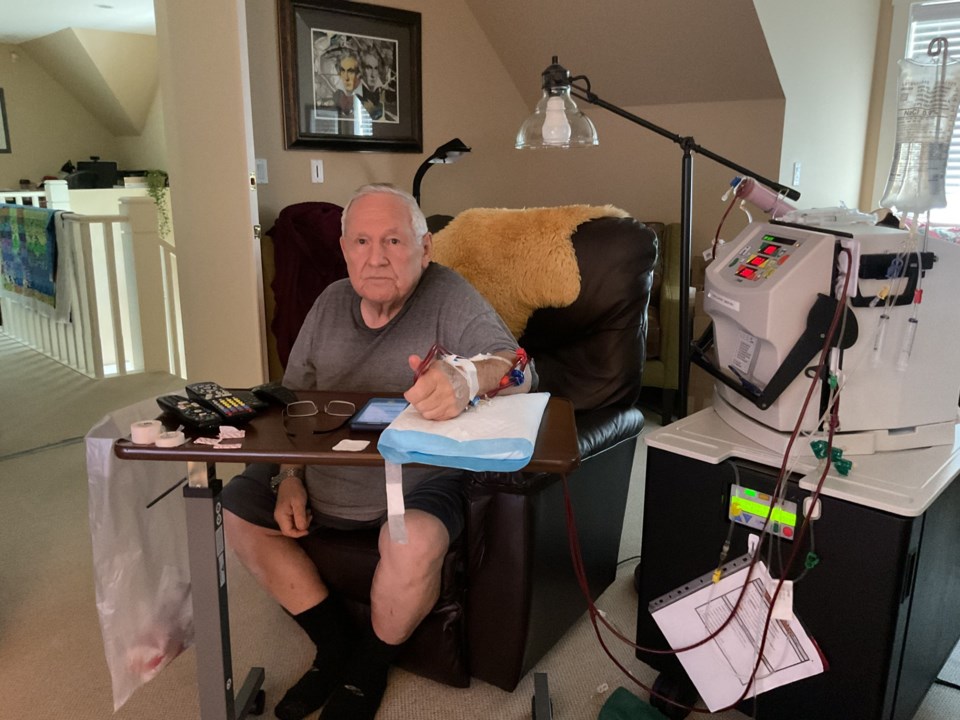A Garden Bay man who has spent his life assisting others, now needs help himself.
Patricia Wenger says her husband, Hans, needs a kidney transplant which, in a best-case scenario, means a living donor.
“A living donor is the best treatment for kidney disease but you have to find your own,” says Wenger, who offered one of her kidneys but it was not a match. “I was so disappointed."
Wenger says she’s spread the word through Facebook and their circle of friends but between that and helping Hans with his dialysis four days a week, it’s become almost a full-time job.
“It’s a lot to deal with,” says Wenger. “We were part of a support group through Vancouver General Hospital with other people in our situation, with two social workers facilitating, and they would bring in guests, like people who have had transplants and people who have donated.”
In some cases, those donors were complete strangers, which gives Wenger hope that something in Hans’ story will speak to someone enough to have them also step up. Hans is a father of two and grandfather of four, who retired from a career in the provincial government and was an avid volunteer before chronic kidney disease forced him to start dialysis. Previously, Hans gave his time as treasurer for the local Senior Housing Initiative, the local branch of the Royal Canadian Legion, and was secretary-treasurer for British Columbia Government Retired Employees Association. Hans also taught the boating course for the Pender Harbour Power and Sail Squadron. Garden Bay residents might also know Hans as their helpful advisor at the tool rental counter at their local Rona store.
Kidney disease is not the only health obstacle Hans has had to overcome. He has also survived colon, bladder and prostate cancer and, most recently, triple bypass heart surgery.
Pat Wegner says a deceased donation is also an option but notes the success rates are sometimes lower. She adds the wait time to find a deceased donor has gotten shorter, but it’s still a long wait. So, for now, Hans and Pat are spending their retirement years at home where they were fortunate enough to have a dialysis machine installed. Part of that option included two months in Vancouver for training, which meant they had to pay for food and housing. Pat Wenger says the costs have been astronomical, but the alternative was for Hans to get dialysis treatments in Sechelt, three days a week, which is a 45-minute drive each way from their home, compounded with the five hours the treatment takes from start to finish. The home dialysis program is four days a week.
“It offers him a better quality of life,” says Wenger.
Dr. Jagbir Gill, medical director of the Kidney Transplant Program at Vancouver-based St. Paul's Hospital, confirms there is no public pool of living donors.
“It could be a friend, it could be a relative, it could be an acquaintance, but it's typically someone that people know,” says Gill. “So, the way people identify living donors is by talking to people in their social circle and their community circle and let people know that they need a transplant.”
Gill says the reason a living donor is preferred is because the outcomes are often better, a patient can bypass the wait list for a deceased donor and, if the transplant is done early enough, they can avoid dialysis.
For a deceased donor transplant, the patient goes through the testing, gets the work up for the surgery and then they go on the wait list. “Those organs are allocated to people on the wait list in a set algorithm,” says Gill. “So, the recipient doesn't have to do anything.”
Gill also confirmed the waiting time for a deceased donor has dropped considerably to about three years.
“About 15 years ago, hospitals started making sure that anyone who could be a potential donor was actually being offered that opportunity,” says Gill. “So that was one big first bump and then, sadly, with the opioid crisis, we are seeing more people who are passing away from overdoses, some of whom can be organ donors.”
Gill says even if someone is just considering becoming a donor, they should contact the program and gather all of the information they need to potentially proceed if interested.
“There are two major principles for donating a kidney. We have to ensure the safety of the people who are coming forward as living donors, that is the number one priority in this entire process,” says Gill. “Even though, of course, we want people to get transplanted, you almost have to put that aside, because these are individuals who do not need to undergo medical procedure for their own health but to help someone else.”
He notes the benchmark for safety is enhanced with a living donor because the program needs to ensure it's not going to cause significant harm to them and they aren't being coerced to do so.
“Those are kind of the key principles about living donation from an ethical and medical standpoint. So, anybody can call and get information, can work through up to a certain point, and if it's not right for them, they can bow out right up until the point they donate. If it's not right for them, they are always the driver seat.”
Anyone interested in learning more about direct donation or the Live Donation Paired Exchange Program, contact St. Paul’s Hospital at [email protected] or the Living Donor Program at Vancouver General Hospital.



